 |
 |
 |
 |
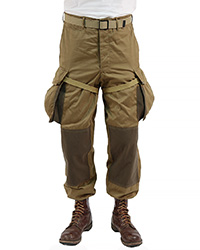
|
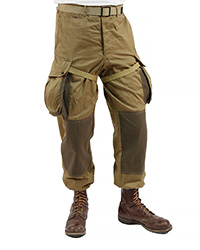
|
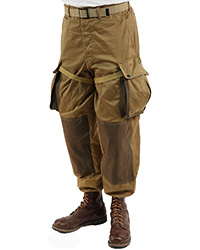
|
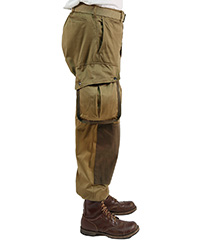
|
Reinforced WWII Jump
Trousers
|
101st pattern leg ties
|
|
|
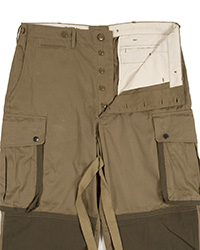
|
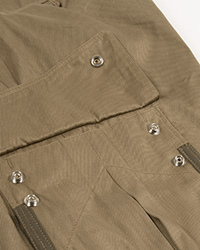
|
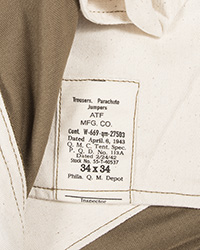
|
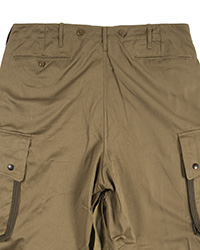
|
|
Button fly
|
Zinc plated Scovil brand snaps
made in USA
|
Made exclusively for ATF
|
Correct rear pocket design
|
Rigger-reinforced trousers as worn during the invasion of Normandy. The jump trousers were introduced for Airborne troops late in 1942. They were made from 8 oz. cotton twill cloth, in the olive drab no. 3 shade (often called "khaki" by newbies). The trousers had a lower rise than the wool pants, button fly, hip, seat and cargo pockets and slightly tapered ankles to make it easier to tuck them into the jump boots. During combat operations in 1943, it was found that the knees wore out quickly and the cargo pocket bellows could blow out during the opening shock of the parachute, which inconveniently scattered their contents all over the sky. In May 1944, troops of the 82nd and 101st Airborne Divisions were told to turn in their worst pair of trousers to the riggers. There they had canvas reinforcing sewn onto the knees and around the cargo pockets. Not all troops received the "improved" uniforms in time for the jump, but it appears most did.
ATF's Trousers: This is the new generation of our M1942 Jump Uniforms. In 2019 we switched to a new contractor for these uniforms and thus spent a great deal of time reinventing the wheel. We already had the patterns made from our original uniforms, but there were several details that I had sought to improve upon, and this proved to be the perfect opportunity. This new run (2022) is by far the best yet- we were able to accomplish all of the changes I set out make save for two.
The majority of the new details are rather minor, but their sum makes for more authentic garment. As for the trousers, there were only minor changes to the pattern- we adjusted the cargo pockets and belt loops slightly. We have retained the zinc plated Scovil brand snaps and the buttons are exact reproductions.
The biggest change (and fail) is the fabric. For years, a handful of "hardcore" paratrooper enthusiasts have asked us to improve the cloth. Cotton twill is still commonly used today, but compared to what's currently available, the WWII fabric has the same physical weight, but feels thinner and harder. That's due to it having been made with finer and more densely woven yarns. This really only apparent if one is holding an original in one hand and a reproduction in the other.
As always, we had the fabric made in the same color used in WWII; olive drab no. 3- not khaki (beige). This run is what I'll call a golden olive tan. As always, there were 3-4 dye lots in this production run so not every uniform is the exact shade as all the others. Any variation will be minor, but full disclosure and all.
The last change is a 50/50 improvement. For years we've tried to get the original style spec labels made- those appear to have been screen printed on coated cotton muslin. The new labels are printed on cotton and look very good, but the raw ends tend to unravel when they're washed. They need a better white coating before printing- we're working on that.
Imported
82nd vs. 101st: The leg ties on our trousers are made form 1" binding tape (webbing) which was "101st style" because 80% of reenactors seem to portray that division. The 82nd Airborne riggers used a strip of olive drab canvas instead, which we do sell. See below. 82nd Leg Ties: We sell the leg ties peculiar to the 82nd Airborne but we no longer offer sewing. Fit: Extra simple. Just order your "normal" waist size, whatever you wear in jeans.
|
|
 |
 |
 |
 |


|
 SIGN IN
SIGN IN SHOPPING BAG ()
SHOPPING BAG ()